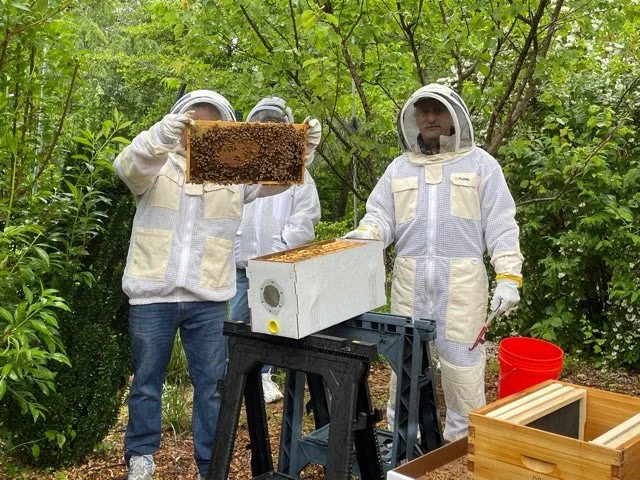The Timeless Tradition of Telling the Bees: A Cultural and Environmental Legacy
This article is written by Maureen Jais-Mick, a member of the Montgomery County Beekeepers Association (“MCBA”). Maureen and her honey bees have shared a home in Bethesda, Maryland since 2013. Interested in BEEcoming a beekeeper in Montgomery County Maryland? Learn more at https://montgomerycountybeekeepers.com.
BEES! Bees! Hark to your bees!
“Hide from your neighbours as much as you please,
But all that has happened, to us you must tell,
Or else we will give you no honey to sell!”*
Important events in our lives - deaths, births, marriages - who do we tell? For generations of beekeepers, it has been our honey bee colonies. Why? Because, if left in ignorance, the bees may abscond, die, or cease honey production. In Scotland and Brittany, bees were invited to weddings and their hives decorated accordingly. In Westphalia, newly married couples had to introduce themselves to the bees or "their married life will be unfortunate."* Božena Němcová's novel Babička (The Grandmother, 1855) ends with the title character saying, "When I die do not forget to tell it to the bees, so that they shall not die out!" There are similar tales from England, Wales, Germany, the Netherlands, France, Switzerland, Bohemia, and the United States.
Upon Queen Elizabeth II's death in 2023, John Chapple, the Royal Beekeeper, "donned his white beekeeping suit and crossed to the small island in the garden lake, where he tended five beehives on behalf of the royal family. Over the top of each hive he draped a black sash. Then he gave a gentle rap on each hive’s side, as though calling the residents’ attention, and told the bees of the Queen’s death. . . 'The mistress has died', Chapple whispered to the bees, 'but don’t you go. Your master will be a good master to you'."*
From various places and times, these tales describe the intimate relationship between beekeepers and nature. They document our respect for the tiny creatures who make wax to light our darkness, who fly to pollinate our crops, and who labor to sweeten our lives. But for how much longer will we remain thus intertwined? In our time, this close relationship is eroded by industrial apicultural and agricultural practices. There is profit in replacing beekeepers with artificial intelligence, in separating humans from nature, in using chemicals to kill indiscriminately. Each day, we humans make choices, good or bad, for the bees.
My hope is that generations from now there will still be a multitude who care for and about the bees and that we will continue to tell the bees when such people have passed away:
O gentle bees, I have come to say
That grandfather fell asleep to-day,
And we know by the smile on grandfather's face
He has found his dear one's biding-place.
So, bees, sing soft, and, bees, sing low,
As over the honey-fields you sweep, --
To the trees abloom and the flowers ablow
Sing of grandfather fast asleep;
And ever beneath these orchard trees
Find cheer and shelter, gentle bees.*
__________________________________
Buried In Work Supports the Montgomery County Beekeepers Association
Andy Zuckerman, whose passing led to the creation of Buried in Work, was a proud member of the MCBA. In his memory, utilize the code “MCBA” for a 10% discount on any Estate Preparation Package. Additionally, in tribute to Andy’s enduring legacy, Buried in Work will donate an additional 10% of the proceeds of sales that use code “MCBA” to the MCBA Bee Impact Grant.
Andy Installing His First Nuc of Bees
About The Montgomery County Beekeepers Association
The Montgomery County Beekeepers Association (MCBA) has its roots in the 1990s, when local beekeepers – many of them involved in the Montgomery County Agricultural Fair – started sharing information about their bee yards and apiary experiences. The Club became official in 2010, when it was incorporated as a non-profit. Since then, the all-volunteer organization has grown steadily in its membership and activities.
With a 2022 membership of more than 500, the Club’s educational offerings include care of an observation hive at Brookside Nature Center, an informational website, a listserv, an introductory course for beginning beekeepers, monthly meetings featuring local and national speakers, and a bee yard that provides hands on bee keeper training and mentoring. MCBA members present programs to garden and community groups, engage with the public at the annual Honey Harvest Festival at Brookside Nature Center, and sell local honey and talk bees with thousands of visitors to the Montgomery County Agricultural Fair – the largest county fair in Maryland. Many MCBA members are also active in the Maryland State Beekeepers Association and the Eastern Apicultural Society.
The Club welcomes members of varying levels of beekeeper experience, assists neighbors throughout Montgomery County experiencing honey bee swarms, and also shares requests from non-beekeepers wishing to host hives on their properties. For more information about the Montgomery County Beekeepers Association, explore this website! https://montgomerycountybeekeepers.com.
Citations & References
* The Bee Boy’s Song; by Rudyard Kipling
* Morley, Margaret Warner (1899). The Honey-Makers. A.C. McClurg. pp. 339–343.
* https://pioneerworks.org/broadcast/will-hunt-telling-the-bees
* Eugene Fields, Telling the Bees


